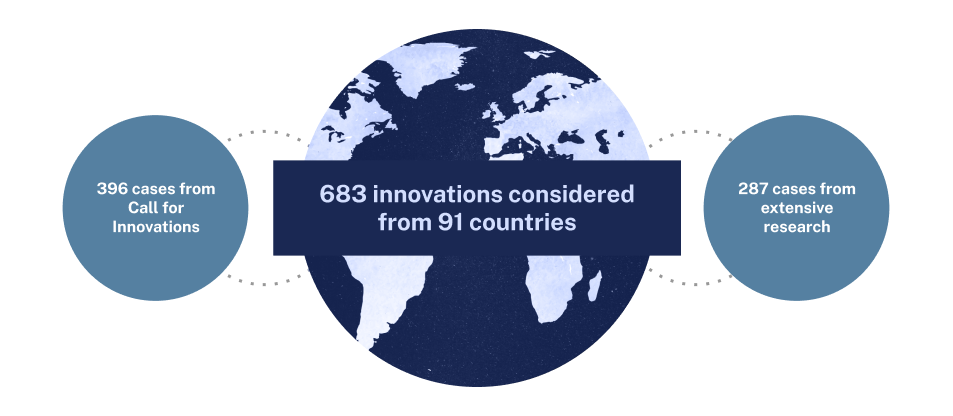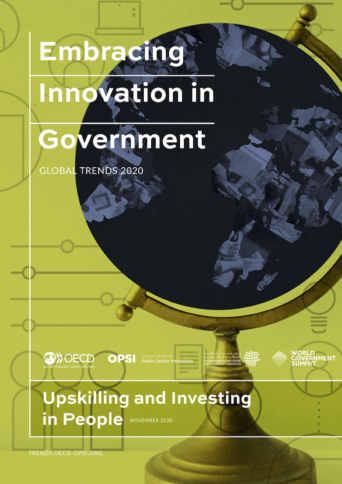Download the Report
Embracing Innovation in Government:
Global Trends 2020
OPSI and the MBRCGI have spent much of the last year working to understand how governments are innovating to cope with rapid change. We have conducted extensive research, held a global Call for Innovations crowdsourcing exercise, and met with innovative teams from around the world to surface key trends, examples and stories. Through this work, OPSI and the MBRCGI have found that governments are testing and implementing exciting and innovative new approaches, transforming the ways in which they operate and serve their people.

For the fifth and final report in this series, OPSI and MBRCGI explore how governments are upskilling and investing in people in innovative ways. Leading efforts in this area fall under two key themes:
Theme 1: Investing in the public as a critical resource.
Investing in the digital, cognitive and socio-emotional skills of all citizens and residents to ensure they are able to meet 21st century challenges and possibilities.
Theme 2: Upskilling the public service to unlock the potential of government.
Infusing the public service with new skills for innovation, collaboration and digital transformation through innovative training and capacity-building initiatives.

Governments have long been concerned with ensuring their citizens and residents are equipped with the right skills to help their countries remain competitive and to promote public wellbeing. However, technological progress through new fields such as artificial intelligence (AI) and robotics are now transforming the ways in which people work, learn, communicate and consume. More than that, they’re transforming societies. As these changes occur, workers will need to upskill or reskill in order to succeed.
One way to ensure citizens and residents learn the digital skills they need to adapt to change and reap the benefits of the digital transformation is the development of initiatives which teach skills in areas like information and data literacy, communicating and collaborating using digital tools, digital content creation, and more. Such initiatives can also help reduce the risk of automation exacerbating inequalities and long-term unemployment.
In addition to digital skills, citizens and residents also require strong cognitive and socio-emotional skills in order to take advantage and compete in the digital revolution. These “soft” skills are critical for adapting to the demands of the future of work and society, and some governments have devised innovative ways to encourage learning in this area, or have developed programmes that cover new types of topics. Such cognitive skills include how to spot and understand fake news and disinformation, how to understand and apply ethical standards to digital technology applications, and how to generally address complex challenges of the digital age.

Digital technologies have changed education and jobs in every sector and at every level in Canada, from basic entry-level jobs to positions requiring a sophisticated level of knowledge. Canada’s success in the digital economy depends on leveraging its diverse talent and providing opportunities for all to participate in the marketplace
CanCode is an innovative upskilling effort from the Government of Canada designed to prepare young Canadians for educational programmes and careers in science, technology, engineering and maths (STEM) fields, and to help them compete in the digital era. Offering subjects like coding, app development, computational thinking, data analysis and robotics, the initiative aims to reach populations that are underrepresented in STEM (e.g. girls, minorities, indigenous persons, those with disabilities and people in remote communities).
CanCode is over halfway towards its current goal of providing more than 4 million upskilling and learning experiences to students and teachers.

In recent years, Finland has been a trailblazer in the field of AI with applications in broader society, the economy and the public sector. To support its ambitious national AI strategy, the University of Helsinki partnered with Reaktor Education to develop and launch “Elements of AI,” a free online course devoted to AI concepts, their societal implications and the building of AI systems. 530 000 students from 170 countries have signed up for the course, with more than 40% of course participants being women, and 25% of applicants over the age of 45.
The course helps to break down barriers, with the skills learned in the Building AI course enabling students to join the AI community in concrete ways. Elements of AI is actively transforming AI consumers into AI contributors, allowing individuals to hold sophisticated conversations and undertake negotiations related to AI, even without the technical expertise of a developer.

Governments have long been concerned with ensuring their citizens and residents are equipped with the right skills to help their countries remain competitive and to promote public wellbeing. However, technological progress through new fields such as artificial intelligence (AI) and robotics are now transforming the ways in which people work, learn, communicate and consume. More than that, they’re transforming societies. As these changes occur, workers will need to upskill or reskill in order to succeed.
One way to ensure citizens and residents learn the digital skills they need to adapt to change and reap the benefits of the digital transformation is the development of initiatives which teach skills in areas like information and data literacy, communicating and collaborating using digital tools, digital content creation, and more. Such initiatives can also help reduce the risk of automation exacerbating inequalities and long-term unemployment.
In addition to digital skills, citizens and residents also require strong cognitive and socio-emotional skills in order to take advantage and compete in the digital revolution. These “soft” skills are critical for adapting to the demands of the future of work and society, and some governments have devised innovative ways to encourage learning in this area, or have developed programmes that cover new types of topics. Such cognitive skills include how to spot and understand fake news and disinformation, how to understand and apply ethical standards to digital technology applications, and how to generally address complex challenges of the digital age.

Design thinking and user-centred approaches have proven to be critical skills for designing and implementing effective government policies and services. However, in order for them to work, governments need to be able to see, understand and interact with the individuals and businesses that their work impacts.
Realising that this represented a challenge in Latvia, the government created the initiative “An Official Shadows an Entrepreneur” to help public officials step into the shoes of business owners, gain new insights into their operations and experiences, and learn new collaborative and user-centred skills. Beneficial for both entrepreneurs and government, the partnership gives businesses the opportunity to receive advice and gives the government official opportunity to better understand how their work and decisions affect end users.
The initiative opened the door for Latvian business owners to new means of interacting with the government, and Government of Latvia officials believe that the initiative constitutes an excellent basis for improving the entrepreneurship environment in Latvia.
The skills and capacities of both the public and public officials is a foundational and cross-cutting issue – one that is critical to securing the competitiveness of citizens and residents in a rapidly changing economy and society, and to ensuring that those working in government are equipped with the capabilities necessary to design and implement innovative policies and services for a 21st century world. As can be seen throughout this report, governments at all levels are taking great strides to ensure their people are not left behind and that their workforce is ready to tackle increasingly complex and uncertain challenges. OPSI and the MBRCGI have identified several recommendations that can help innovative countries take their upskilling efforts to new levels and also assist others in catching up:
Additional details on these recommendations, as well as tools and resources for achieving them, are discussed in the full report.
The individuals that comprise society and keep the machinery of government advancing in pursuit of its mission represent a valuable natural resource that is critical for ensuring that countries can remain competitive in the modern economy, keep up with rapid technological shifts and growing complexity, and meet the changing and growing demands of their people. Like other natural resources, actions must be taken and investments must be made in order to bring about the full potential of the resource. Governments are actively developing innovative upskilling efforts that do exactly this. By investing in the innovation, digital, cognitive, and socio-emotional skills of their people and the public servants who work in their interest, as well as retooling structures to support these skills, governments are providing them with new opportunities and pathways for successful and positive outcomes. When taken collectively, this improves the standing and potential for all.
While major efforts are underway by governments across the world, there are opportunities to take these initiatives even further. Governments must continue to strive to address gaps that hold them back, including gaps in skillsets, but also gaps in structures (e.g., linkages within and across government to promote skills diffusion and culture change), geography (e.g., the global south), under-represented groups (girls and women in STEM fields, ethnic minorities), and those at risk for falling through the cracks (e.g., older workers whose jobs are at risk of automation).
This report is the fifth and final in a series of reports on 2020 global innovation trends. As is the focus of the launching event for this report, Government After Shock, the world has changed drastically over the course of the year. The COVID-19 pandemic has shaken our understanding of the world and how things should work. Despite all of the past and ongoing upheaval, and the uncertainty of what will happen next, one thing has been made even clearer: the citizens, residents, and colleagues that comprise our societies, communities and workplaces are what matter the most. As shown in this report, and in the four 2020 Global Trends report that preceded it, governments are taking innovative action to support them, equip them with the skills and abilities needed for the 21st century, and work with them in laying out a foundation for prosperous futures.
